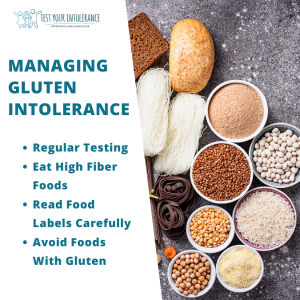Gluten intolerance is quite common, and it’s caused by consuming gluten. Gluten is a protein in some grains, including wheat, rye, and barley. Around 1.9% of Canadians consume a gluten-free diet due to gluten sensitivity or celiac disease. However, most people with this intolerance don’t get a proper diagnosis.
Gluten intolerance isnt life-threatening, but it can give you uncomfortable symptoms in your daily life. The best way to know if you truly have an intolerance is by taking an Intolerance Test.
How do I know if I’m gluten intolerant?
Some symptoms will help you know you may suffer from gluten sensitivity or intolerance. These symptoms include:
- Bloating
- Stomach pain
- Nausea
- Constipation
- Fatigue
- Neuropathy
- Skin problems like rashes, eczema, or psoriasis
- Anemia
- Anxiety
Difference between gluten sensitivity and celiac disease
While gluten intolerance is caused by sensitivity to gluten, celiac disease is an autoimmune condition caused by gluten. So, while both have gluten as the primary trigger, gluten affects the body differently in both pathologies.
People who have celiac disease often experience intestinal damage upon consuming gluten. So, celiac disease tends to be more damaging compared to gluten sensitivity. However, the similarity between these diseases is that they both have the same symptoms, and it can be challenging to know which one you are suffering from.
To know if you have gluten sensitivity or celiac disease, you must invest in an Allergy and Intolerance Test to check for both conditions. The immune system of those with celiac disease fights off gluten as if it were a virus. This reaction to gluten often causes damage and inflammation to their digestive tracts.
People who have celiac disease also have too many antibodies in their blood to fight off gluten. People with celiac disease often have an abnormal gene that causes this condition, while those with gluten intolerance don’t.
Difference between gluten intolerance and gluten allergy
While both conditions are caused by gluten, one is more severe. Gluten allergy is a response caused by the body’s immune system once you consume gluten. On ther other hand, gluten sensitivity doesn’t trigger your body’s immune system.
A gluten allergy causes symptoms sooner than an intolerance. For example, if you have a severe reaction to gluten, you’ll notice symptoms immediately after consuming gluten. However, when it comes to this intolerance, symptoms could take upto to 72 hours.
Gluten allergy can also be severe to the extent of being life-threatening. However, an intolerance isn’t. Most gluten intolerance can make your life difficult but won’t cause life-threatening symptoms.
Who does gluten intolerance affect?
Gluten intolerance affects more women compared to men. While some people are born with the intolerance, others develop it later. It is common to develop the intolerance later in life, even though you’ve been consuming it all your life.
In most populations, it’s common to find a ratio of 2:1 women to men who suffer from this. If you think you may have an intolerance, you should get tested to manage it and avoid symptoms.
Causes of gluten intolerance
There is conflicting research on what may be the cause of gluten intolerance. It still needs to be better understood, and much study is underway to shed more light on this topic. However, some researchers believe that the intolerance isn’t caused by a sensitivity to gluten but by a particular carbohydrate in many foods.
The common issue with food intolerance is the sensitivity of your body. When you have this intolerance, your body can’t absorb or fully break down gluten which results in that being pushed into the colon, where it’s fermented and causes the symptoms we associate with food intolerance.
Some more research points to wheat affecting your intestinal tract lining. Your gut lining purposes to keep bacteria from leaking from your intestines. The lining may not work as it should when suffering from this intolerance.
When the lining doesn’t work usually, it can cause bacteria to leak into the blood. It can even cause leakage in the liver, causing inflammation in the body. When this happens, a host of symptoms show up, making you feel unwell.
How to treat gluten intolerance
There is currently no cure for gluten intolerance or sensitivity; however, following a gluten-free diet can relieve you. You can also add probiotics with the assistance of your doctor into your diet to help increase the population of good gut bacteria in your gut. Introducing probiotics to your diet can help you reduce bloating, constipation, and gas symptoms.
New research is looking into enzymes that can help your body digest gluten. However, this research is still undergoing and is not a formal method of treating the intolerance. However, once it becomes mainstream, it could solve the issue of the intolerance and save a lot of individuals suffering from the symptoms.
How to manage gluten intolerance

Living with this intolerance may be difficult initially, but it eventually gets easier as you keep living with it. Managing a gluten intolerance requires you to learn the ingredients in food, understand what to eat or not eat, and have specific places to eat outside where you’re sure they understand your intolerance.
To manage gluten intolerance, you need to:
- Get tested regularly for high cholesterol, anemia, and vitamin and nutritional deficiencies.
- Consume a high-fiber, low-fat diet
- Read drinks and food labels carefully
- Learn which food items contain gluten and avoid them
Final thoughts
If you think you may have gluten intolerance, getting an Intolerance Test is necessary so you can be sure that’s what you’re suffering from and not something similar to celiac disease. Having this intolerance will make you feel sick every time you consume foods with gluten, so you need to avoid them. With the help of a dietitian, you can manage your diet and live symptoms-free.

